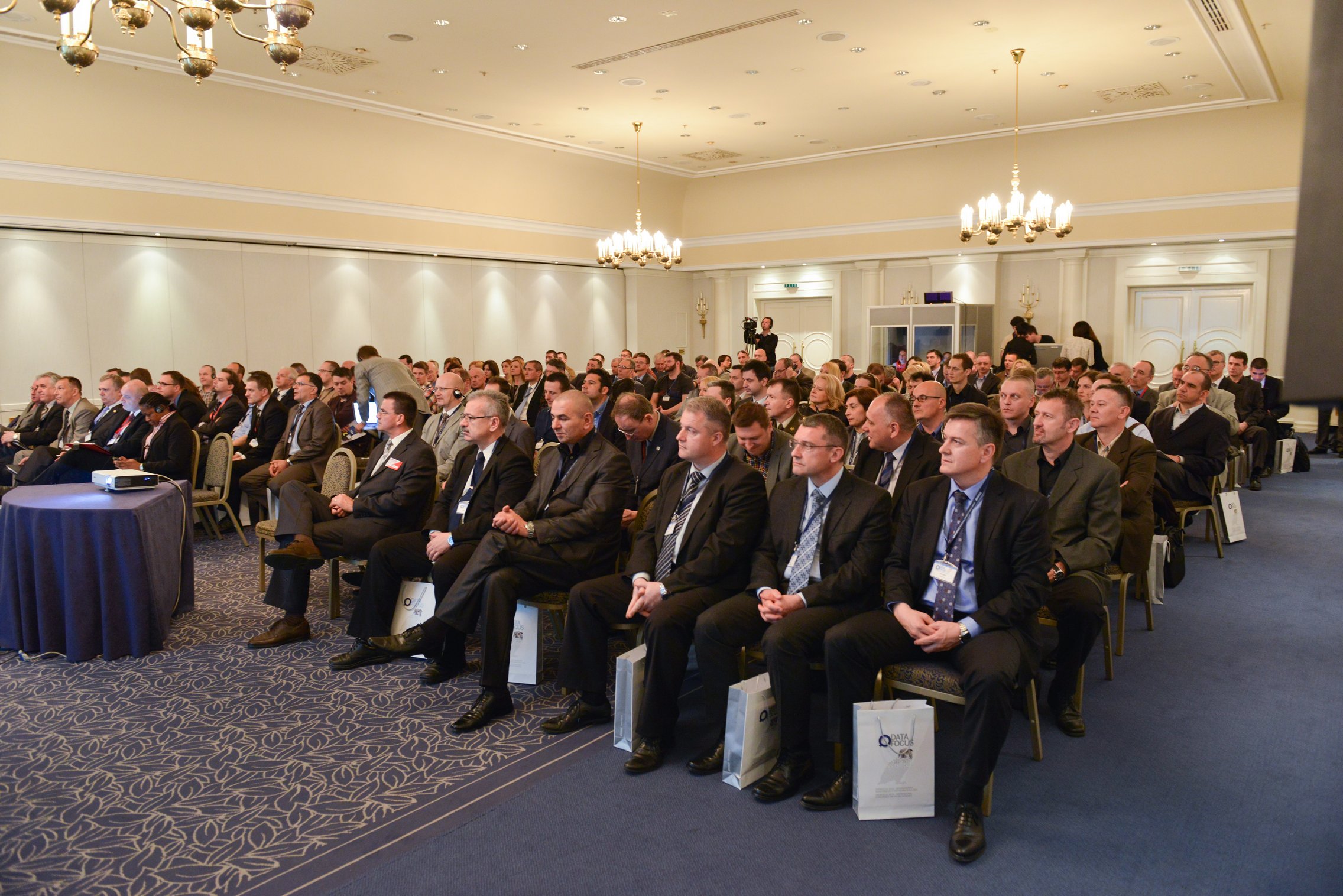
DataFocus 2013
9th of April | Hotel Antunović, Zagreb, Hrvatska
DataFocus is all about exchanging experiences
We bring together law enforcement investigators, prosecutors, judges, court expert witnesses, and other experts, and let them talk about their experiences with digital evidence and digital forensic investigations.
Since 2012
Every year
Entrance
DataFocus 2023 is divided into several sections
Explore distinct sections offering insights into technical facets of evidence handling, showcase the latest products and services, and participate in interactive workshops.
Investigation section
Lecturers address technical aspects of finding, preserving, and processing digital evidence and the legal presentation of digital evidence in criminal and administrative proceedings.
Technical section
Experts provide lectures showcasing and demonstrating the latest products, services, and trends in the digital forensic field.
Workshops
At the event, our partners will conduct a series of workshops, providing participants with opportunities for personalized inquiries and live demonstrations.
Agenda
Agenda
8:00 - 8:30
REGISTRATION, WELCOME COFFEE
8:30 – 8:50
Opening ceremony: Goran Oparnica, BSc, Managing Director, INsig2 Dragan Novosel, LLM, First Deputy Attorney General of the Republic of Croatia, Evelin Tonković, LLM, Deputy Minister of Interior of the Republic of Croatia
Zoran Šprajc
Ceremony host8:50 - 10:30
Keynote presentations Training of prosecutors in the UK
Esther George
LLB (Hons), LLM, MA, Senior Policy Advisor at Crown Prosecution Service, UK8:50 -10:30
Keynote presentations Training of prosecutors in the UK
Esther is a Senior Policy Adviser and prosecutor based at the Crown Prosecution Service (CPS) HQ Strategy and Policy Directorate, London. Esther specializes in internet and computer-enabled crime, digital evidence, intellectual property theft and data protection. In January 2002 Esther became the project manager for the CPS High-Tec Crime Project. Esther has advised prosecutors at all levels within HQ and Area CPS offices, police, and other Government bodies. Esther presently acts as a consultant to other prosecutors in high-tec crime cases. She developed and designed the CPS national high-tec crime training course for prosecutors and as a result, the CPS has a trained cadre Of high-tec crime specialists. Esther regularly speaks on high-tec crime issues at conferences and training sessions nationally and internationally. In 2010 Esther received a Certificate of Merit award from the International Association of Prosecutors for initiating and developing the Global Prosecutors E-Crime Network (GPEN) which is an on-line information sharing network to help solve high-tec crime around the world.
8:50 - 10:30
Keynote presentation: Importance of Digital Evidence in Criminal Procedure
Dražen Tripalo
LLM, Judge of the Supreme Court of the Republic of CroatiaKeynote presentation: Importance of Digital Evidence in Criminal Procedure
He graduated from the Faculty of Law, University of Zagreb, in 1984. Mr. Tripalo was appointed the Judge of the Supreme Court of the Republic of Croatia in 2004. He was appointed the Judge of the County Court in Zagreb in 1996, where he served as the President of the First Instance Criminal Law Department from 1998 to 2004. He began his career as the Judge of the Municipal Court in Zagreb in 1998 and worked as a military court judge for three years, from 1993 to 1996.
8:50 - 10:30
Keynote presentation: International Criminal Justice Cooperation in Information Society
Prof. Zlata Đurđević
PhD, Faculty of Law, Croatia8:50 - 10:30
Keynote presentation: International Criminal Justice Cooperation in Information Society
Zlata Đurđević is a full professor at the Faculty of Law, University of Zagreb, where she held the Chair of the Department of Criminal Law since 2007. She completed her PhD with the thesis “Criminal Law Protection of the European Union Financial Interests” at the Faculty of Law in Zagreb, in 2003. She passed the state bar exam in December 1994, upon completing a judicial internship at the County Court in Zagreb. Special areas of her interest include criminal procedural law, European Union criminal law, human rights and mental health law. She is fluent in English and German and has a passive command of French. She was awarded several international academic grants, including the German DAAD Grant, the Austrian OeAD Grant, and the Fulbright Scholarship. She is the Vice President of the Croatian Association of European Criminal Law, a member of the Managing Board of the Croatian Association for Criminal Law Sciences and Practice (www.pravo.hr/hukzp) and the European Criminal Law Academic Network Contact Point for Croatia (ECLAN, www.eclan.eu). She is a member of the Croatian State’s Attorney Council and of the Asylum Commission of the Republic of Croatia. Currently, she is the project manager of five scientific research projects. She has been a member of the Executive Committee of the International Association of Penal Law (AIDP, www.penal.org) since 2009. She spent the 2009/2010 academic year as a guest lecturer at the University of California, Berkeley, USA. She spoke at over thirty symposiums and conferences in Croatia and abroad, as well as published five books and over thirty scientific papers in Croatian and foreign publications.
8:50 - 10:30
Keynote presentation: Croatian Criminal Law and the Challenge of Cybercrime
Prof. Davor Derenčinović
PhD, Faculty of Law, Croatia8:50 - 10:30
Keynote presentation: Croatian Criminal Law and the Challenge of Cybercrime
Prof. Davor Derenčinović, PhD, was born in Zagreb, on 7 August 1970. He graduated from the Faculty of Law in Zagreb in 1995 and gained a master’s degree from the same Faculty in 1998. He completed his PhD by the thesis “Corruption in Criminal Law” in 2000. Since 2010, he has been the Chair of the Department of Criminal Law at the Faculty of Law, University of Zagreb. He completed his postgraduate studies at the International Human Rights Law Institute, DePaul College of Law, Chicago, as the recipient of the 2004 – 2005 Fulbright Scholarship. In addition, he completed professional development programs at the Institute Superiore Internazionale di Scienze Criminali in Syracuse, at the Academy of European Law in Trier and at the London School of Economics. He is the founder and the director of the international course “Crime Prevention through Criminal Law and Security Studies” offered to postgraduate students at the Inter-University Centre in Dubrovnik. So far he has published about a dozen books and more than fifty scientific and professional papers in the field of criminal law and protection of human rights, as both author and co-author. In addition to his position at the Faculty of Law in Zagreb, he is a lecturer in a number of graduate and postgraduate (specialist and doctoral) studies in Croatia and abroad. As a member of several working groups at competent ministries, he participated in drafting and amending a large number of criminal laws. He was a contributor to a number of Croatian and international scientific projects and the manager of the “Criminal Law in Prevention of Corruption and Organised Crime” project funded by the Croatian Ministry of Science and Education. He is a member of working groups for the preparation of negotiations on Chapter 23 and Chapter 24 of the European Union acquis communautaire. He was appointed an expert advisor by the United Nations Office for Drugs and Crime (UNODC) and ad hoc judge by the European Court of Human Rights. Until 2005 he was a member of the Council of Europe Committee of Experts on Terrorism (CODEXTER). He is the Vice President of the Group of Independent Experts for the Implementation of the Council of Europe Convention on Action against Trafficking in Human Beings (GRETA), the President of the Croatian Association of Criminal Sciences and Practice, one of the founding members and the Secretary of the Croatian Academy of Legal Sciences, an Editor-in-Chief of the Croatian Academy of Legal Sciences Yearbook, a member of the Court of Honour of the Zagreb Society of University Teachers, Scholars and Other Scientists, a member of the Croatian Parliament Legislation Committee and the Vice President of the Croatian State’s Attorney Council. He was awarded the Croatian Homeland War Memorial Medal.
10:30 - 10:45
COFFEE BREAK
10:45 - 11:15
Contemporary Trends in High-Tech Crime and Experiences of the Ministry of the Interior of the Republic of Serbia
Ph.D. Branislav Veselinović
Police Director at the Ministry of the Interior of the Republic of Serbia11:15 - 11:45
Slovenian Police and Cybercrime
Toni Kastelic
BSc(Econ), Head of Computer Investigation Centre, Criminal Police Directorate of the Republic of Slovenia11:45 - 12:15
Experiences of the Ministry of Interior in the Fight against High-Tech Crime
Ivan Mijatović
High-Tech Crime Unit, National Police Office for Suppression of Corruption and Organized Crime, Croatia12:15 - 12:45
Encrypted Content Forensics
Mr. sc. Damir Palavra
Permanent Court Expert Witness, Croatia12:15 - 12:45
Encrypted Content Forensics
The inflation of cryptographic solutions, especially full disk encryption (FDE), greatly complicates (if not completely undermines) the daily work of digital forensics experts. One of the paradigms of digital evidence examination is that digital evidence must be preserved unchanged and thus remain viable for further expert analysis and examination. Unfortunately, in cases where FDE solutions are applied to systems, such limitation represents an insurmountable barrier to analysis and examination in the majority of cases. If we draw a parallel with cases from “classic forensics” where, for example, in order to exclude a DNA sample or a fingerprint from the crime scene one cannot avoid affecting the evidence and the crime scene themselves, the question arises as to why this would be different in digital forensics. The most common obstacle in the examination of encrypted digital evidence is that, in order for an examination to be possible at all, certain procedures must be carried out the very moment the police or other law enforcement officers seize hardware. New cloud technologies and solutions show a lot of promise in this area, especially for brute-force attacks.
Lecturer:
Damir Palavra
Permanent Court Expert Witness, Croatia
Damir Palavra is an independent forensic investigator and court-appointed expert in the field of computer science, electronics and telecommunications. He graduated from the Faculty of Electrical Engineering and Computing in Zagreb in 2002 and obtained a Master’s degree. He was appointed as a permanent court expert in the field of Informatics in 2013. In the last 15 years, Damir has been working intensively in the field of digital security, computer forensics, and consulting in IT technologies.
12:45 - 14:00
LUNCH
14:00 - 14:30
ButterFly Malicious Code Case – International Experience from Slovenia
Borut Štok
Head of the Computer Investigation Unit, Police Directorate Maribor, Slovenia14:30 - 15:00
“SpyEye” Malicious Software
Dražen Višnjić
Head of the Special Department for Combating High-Tech Crime, Ministry of Interior of the Republic of Srpska, Bosnia and Herzegovina15:00 - 15:30
ISO 27037 – Guidelines for Identification, Collection, Acquisition and Preservation of Digital Evidence
Damir Paladin
MSc, Permanent Court Expert Witness, Croatia15:00 - 15:30
ISO 27037 – Guidelines for Identification, Collection, Acquisition and Preservation of Digital Evidence
The collection and storage of digital evidence is a critical phase of the forensic procedure which precedes analysis and taking of evidence. The improper and inadequate handling of data, that are the basis for further procedures, reduces the credibility of the whole procedure, thereby calling into question the accuracy of final conclusion in legal proceedings. The International Standard ISO/IEC 27037 is the first document of importance that describes the process of identification, collection, acquisition and preservation of digital evidence in computer-oriented criminal offenses. It guides various individuals participating in this process – from law enforcement agents and court experts to response specialists who must promptly react to an incident. The presentation will introduce the process of collecting and storing digital evidence as prescribed by ISO/ IEC 27037, with a special emphasis on the description of proposed measures. In addition, we will discuss the best applications of ISO/IEC 27037 in practice.
Lecturer:
Damir Paladin
MSc, Permanent Court Expert Witness, Croatia
Damir Paladin is an Information Security Consultant. He has been professionally engaged in information technology for over 25 years. In 1998 he founded his own company, Borea, which he manages to this day. His area of expertise includes computer forensics, as well as auditing and testing the security of information systems. He is the holder of CISSP, CISA and CISM professional security certifications. In addition to being a permanent court expert witness in IT, he regularly collaborates with some of the most important Croatian companies and institutions providing expert services in the area of information security.
15:30 - 16:00
Legal Procedures for Seizing IT Equipment in Slovenia
Tadej Stergar
MSc, Director, Institute of Forensics of Information Technologies, SloveniaJanko Šavnik
Information Security Specialist, Institute of Forensics of Information Technologies, Slovenia16:00 - 16:30
Cloud Forensics
Primož Kragelj
Senior Consultant Deloitte Audit, Slovenia16:30 - 17:00
Closing ceremony: Tombola, Final words of the organizer
8:00 - 8:30
REGISTRATION, WELCOME COFFEE
8:30 - 8:50
Opening ceremony
HALL 1
8:50 - 10:30
Keynote presentations
HALL 1
10:30 - 10:45
COFFEE BREAK
10:45 - 11:15
Legal Regulation of Electronic Evidence in Criminal Proceedings
Asst. Prof., Faculty of Law, Croatia Elizabeta Ivičević Karas
Faculty of Law, Croatia11:15 - 11:45
Legal Aspects of Secret Online Investigations
Ph.D. Matko Pajčić
Asst. Prof., Faculty of Law, Croatia11:45 - 12:15
New Criminal Code Provisions for Cybercrime
Aleksandar Maršavelski
LL.M. Faculty of Law, Croatia11:45 - 12:15
New Criminal Code Provisions for Cybercrime
The presentation gives an analysis of certain criminal offenses included in Chapter XXV of the new Croatian Criminal Code: unauthorized access (Article 266), disruption of computer systems (Article 267), damage to computer data (Article 268), unauthorized interception of computer data (Art. 269), digital counterfeiting (Article 270), computer fraud (Article 271) and misuse of devices (Article 272). A brief overview of other criminal offenses in the area of cybercrime included in the new Croatian Criminal Code will also be provided.
Lecturer:
Aleksandar Maršavelski
LLM, Faculty of Law, Croatia
12:15 - 12:45
Protection of Intellectual Capital in the Digital Age
Mladen Vukmir LLM, Vukmir & Associates, Croatia
Vukmir & Associates12:45 - 14:00
LUNCH
14:00 - 14:30
Digital Evidence in Civil Proceedings
Martina Živanović
Senior Judicial Council of the County Court in Velika Gorica, Croatia14:30 - 15:00
Privacy on the Internet
Ph.D. Željko Ivanković
Magazine Bank, Croatia15:00 - 15:30
What Traces are Left by Digital Attackers?
Mr. sc. Predrag Pale
Faculty of Electrical Engineering and Computing15:30 - 16:00
Cooperation between Private and Public Sector in Expert Testimony
Prof. Ph.D. Miroslav Bača
Faculty of Organization and Informatics, Croatia15:30 - 16:00
Cooperation between Private and Public Sector in Expert Testimony
Nowadays, there are no criminal offenses that do not produce digital evidence, no matter whether they concern mobile phones, computers, computer networks or some other type of device holding digital evidence. Investigators in charge of such offenses are often constrained by equipment and require specific knowledge. This raises the question of justification, that is, the necessity of cooperation with independent private forensic laboratories that are able to promptly deliver their services in accordance with legal regulations and, indeed, at the price of work that has actually been performed. The presentation will give an overview of segments and manners in which such laboratories and their employees may be involved, as well as the advantages and disadvantages of such partnerships.
Lecturer:
Miroslav Bača
Profesor, Faculty of Organization and Informatics, Croatia
Miroslav Bača is a Full Professor at the Faculty of Organization and Informatics in Varaždin and the Head of the Centre for Biometry. He is a permanent court expert witness in biometry, informatics, and telecommunications, a certified expert evaluator for IT products and IT-based services at the European Privacy Seal, and the Head of the Professional Section for Electrical Engineering, Electronics, Telecommunications and IT Technology of the Croatian Association of Court Expert Witnesses and Valuers. In addition, he is the author of over 100 scientific and professional papers in the field of forensics and biometrics.
16:00 - 16:30
Electronic Signature
Irena Kukina MSc
Consultant, INsig2, Croatia16:30 - 17:00
Closing ceremony
HALL 1
10:45 - 11:15
UFED Workshop Mobile Device Forensics
Yuval Ben-Moshe
Forensics Technical Director, Cellebrite, Izrael14:00 -14:30
Guidance Software Forensic Solutions – Advancing the Practice of Digital Forensics
Steve Gregory
EnCE, Forensic Solution Specialist Guidance Software, UK14:30 - 15:00
Forensic Workstations
Kai Jessen
Sales Manager, mh-SERVICE, Germany15:00 - 15:30
Catching the Ghost: How to Discover Ephemeral Evidence with Live RAM Analysis
Yuri Gubanov
Founder and CEO, Belkasoft, Russia15:30 - 16:00
Countering the Technical and Practical Hurdles Challenging Lawful Intercept
Sune Græsbøll Ottesen
BAE Systems Detica, Denmark16:00 - 16:30
Faster Child Exploitation Evidence Processing Using Biometric and Image/Video Recognition Technologies
Antoine Normand
CEO BlueBear LES, Canada16:30 - 17:00
Closing ceremony
HALL 1
Plenary lecturers
Esther George
LLB (Hons), LLM, MA, Senior Policy Advisor at Crown Prosecution Service, UK
Biography
Esther is a Senior Policy Adviser and prosecutor based at the Crown Prosecution Service (CPS) HQ Strategy and Policy Directorate, London. Esther specializes in internet and computer-enabled crime, digital evidence, intellectual property theft and data protection. In January 2002 Esther became the project manager for the CPS High-Tec Crime Project. Esther has advised prosecutors at all levels within HQ and Area CPS offices, police and other Government bodies. Esther presently acts as a consultant to other prosecutors in high-tec crime cases. She developed and designed the CPS national high-tec crime training course for prosecutors and as a result, the CPS has a trained cadre Of high-tec crime specialists. Esther regularly speaks on high-tec crime issues at conferences and training sessions nationally and internationally. In 2010 Esther received a Certificate of Merit award from the International Association of Prosecutors for initiating and developing the Global Prosecutors E-Crime Network (GPEN) which is an on-line information sharing network to help solve high-tec crime around the world.
Lecture:
Training of prosecutors in UK
08:50 – 9:20, Hall 1
Dražen Tripalo
LLM, Judge of the Supreme Court of the Republic of Croatia
Biography
He graduated from the Faculty of Law, University of Zagreb, in 1984. Mr. Tripalo was appointed the Judge of the Supreme Court of the Republic of Croatia in 2004. He was appointed the Judge of the County Court in Zagreb in 1996, where he served as the President of the First Instance Criminal Law Department from 1998 to 2004. He began his career as the Judge of the Municipal Court in Zagreb in 1998 and worked as a military court judge for three years, from 1993 to 1996.
Lecture:
Importance of Digital Evidence in Criminal Procedure
9:20 – 9:40, Hall 1
Zlata Đurđević
PhD, Faculty of Law, Croatia
Biography
Zlata Đurđević is a full professor at the Faculty of Law, University of Zagreb, where she held the Chair of the Department of Criminal Law since 2007. She completed her PhD by the thesis “Criminal Law Protection of the European Union Financial Interests” at the Faculty of Law in Zagreb, in 2003. She passed the state bar exam in December 1994, upon completing judicial internship at the County Court in Zagreb. Special areas of her interest include criminal procedural law, European Union criminal law, human rights and mental health law. She is fluent in English and German, and has a passive command of French. She was awarded several international academic grants, including the German DAAD Grant, the Austrian OeAD Grant and the Fulbright Scholarship. She is the Vice President of the Croatian Association of European Criminal Law, a member the Managing Board of the Croatian Association for Criminal Law Sciences and Practice (www.pravo.hr/hukzp) and the European Criminal Law Academic Network Contact Point for Croatia (ECLAN, www.eclan.eu). She is a member of the Croatian State’s Attorney Council and of the Asylum Commission of the Republic of Croatia. Currently, she is the project manager of five scientific research projects. She has been a member of the Executive Committee of the International Association of Penal Law (AIDP, www.penal.org) since 2009. She spent the 2009/2010 academic year as a guest lecturer at the University of California, Berkeley, USA. She spoke at over thirty symposiums and conferences in Croatia and abroad, as well as published five books and over thirty scientific papers in Croatian and foreign publications.
Lecture:
International Criminal Justice Cooperation in Information Society
9:40 – 10:00, Hall 1
All lecturers
Esther George
Dražen Tripalo
Zlata Đurđević
Davor Derenčinović
Branislav Veselinović
Elizabeta Ivičević Karas
Yuval Ben-Moshe
Toni Kastelic
Matko Pajčić
Ivan Mijatović
Aleksandar Maršavelski
Damir Palavra
Mladen Vukmir
Borut Štok
Martina Živanović
Steve Gregory
Dražen Višnjić
Željko Ivanković
Kai Jessen
Damir Paladin
Predrag Pale
Yuri Gubanov
Tadej Stergar
Janko Šavnik
Miroslav Bača
Sune Græsbøll Ottesen
Primož Kragelj
Irena Kukina
Antoine Normand

Hotel Antunović
Zagrebačka avenija 100a, 10090, Zagreb, Croatia
DataFocus Archive
DataFocus is an international conference on digital evidence that we have been successfully organizing since 2012.
see all



